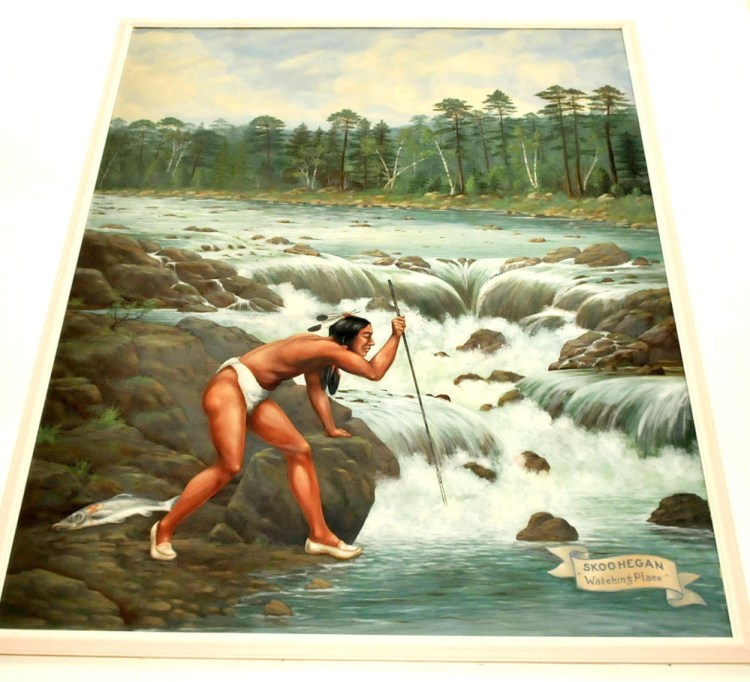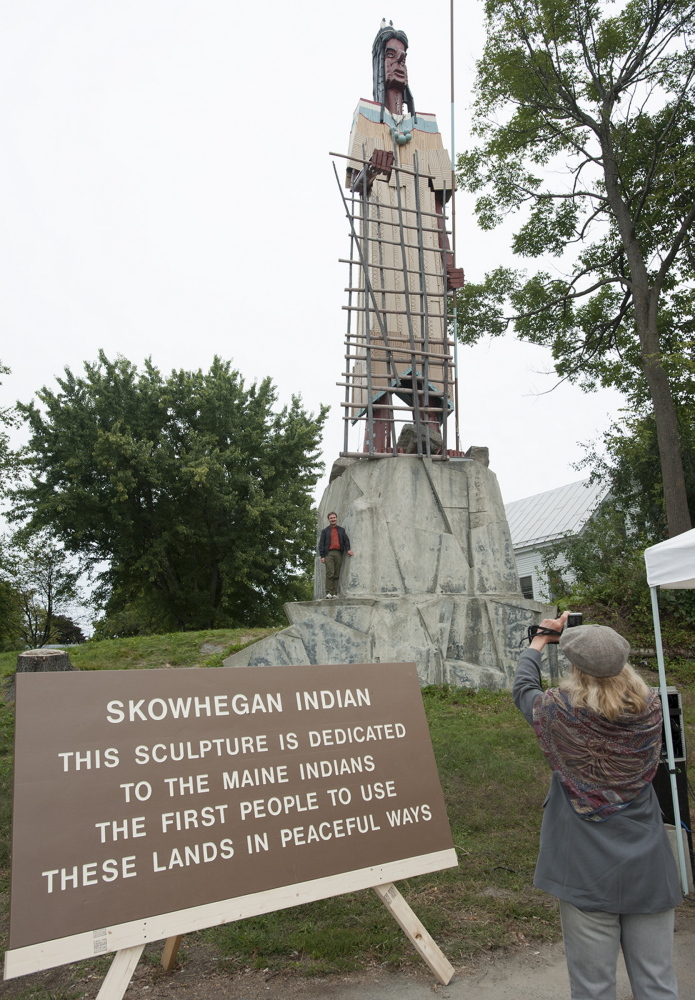SKOWHEGAN — A postal clerk in Skowhegan in the 1870s amused himself one year by making a list of 140 different spellings of the name “Skowhegan” that he had found on letters sent to town residents and businesses over the years.
That’s according to Louise Coburn in her book “Skowhegan On The Kennebec,” published in 1941. There also were several translations of the meaning of the name “Skowhegan” — one dating back to the King George map in the British Museum dated 1755, calling the location Schoogun Falls and Island, Coburn wrote.
But the recent controversy about the use of the “Indians” mascot by Skowhegan school sports teams has sparked another debate: Is the town’s name being translated correctly?
The official and long-held translation of the name “Skowhegan” by local historians has been “a place to watch,” referring to how Native Americans watched for fish to spear and trap as they traversed the mighty falls of the Kennebec River.
Another translation of the name is offered by Roger Paul, a Passamaquoddy Indian language teacher, who spoke April 13 during a joint meeting of a school board subcommittee, and 10 members of the Wabanaki Indian federation.
Paul said his interpretation of the name “Skowhegan” from the Passamaquoddy language is broken down into two parts — the first part of the word meaning “brook trout,” the second meaning “fishing with a weir,” or a large net, such as the one featured in the Skowhegan Indian sculpture by Bernard Langlais.
“My job is to teach that we’re not gone. We’re still here, we still speak our language, we still follow our traditions,” Paul told the school board subcommittee. “My job now is to untangle the history and actually share wherever I can about our ways — even the name ‘Skoohegan’ — I read somewhere that it meant ‘looking place.’ ‘Skoohegan’ is actually what we would name a brook trout fishing weir, and I believe your statue holds one.”
The “Indians” nickname and how it relates to Skowhegan sports teams has become a focal point for local residents and members of four tribes that make up Maine’s Wabanaki federation, who say continued use of the word “Indians” by the school district as a mascot name is offensive. Representatives of the Penobscot, Passamaquoddy, Maliseet and Micmac tribes told subcommittee members that the use of the word “Indians” is an insult to Native Americans, who long have suffered racial prejudice, and they want the name changed.
Those in the Skowhegan area who support continued use of the name say it is an important school tradition — their Skowhegan heritage — and they disagree with the Indian representatives, saying it is a way of respecting the people who lived for centuries on the banks of the Kennebec River.
Lee Granville, an associate curator at Skowhegan History House & Research Center, writes in “The Early History of Skowhegan” that there is uncertainty about the origin and meaning of the name “Skowhegan.”
“One source says that in the Abnaki language it means ‘Falls by the Pine Plain Lands,'” Granville writes. “Another says that ‘Skowhegan’ is the Indian word for ‘spearing’ or ‘place to watch.’ Most historians lean toward the latter translation, but either would have been descriptive. In any event, the name Skowhegan was used by the Indians long before the first white settlers arrived to build their own community and adopting the same name.”
History House President and Director Melvin Burnham said early photographs of Skowhegan high school athletics show sweaters or uniforms with only “SHS” emblazoned on them. The first mention of “Indians” and fighting came in a 1930 newspaper article about the school principal and the school song that he wrote.
Burnham said the high school could have adopted a sports mascot anytime from 1930 until the early 1970s, when Maine towns assembled into school administrative districts. Skowhegan-based School Administrative District 54 includes the towns of Canaan, Cornville, Mercer, Norridgewock, Skowhegan and Smithfield.
Author Louise Coburn was the niece of Maine Gov. Abner Coburn. She was one of the five founders of Sigma Kappa sorority and a pioneer for women’s education at Colby College in Waterville, where she served as the first female trustee. She wrote that Skowhegan was the Indian name for both the falls and the island in the river.
She said the name had many different spellings in diaries by men who took part in Benedict Arnold’s ill-fated journey up the Kennebec River to the Dead River and into Canada. Those spellings included “Cohegan,” “Sou Hegan,” “Squhegan” and “Scowhegan,” among many others.
Coburn cites Judge C.E. Potter in his “Appendix to Language of the Abnaquies” as saying the original meaning was thought to be “worn out land,” “pine plains” or “pine plains land.”
She said the sandy flats above the river along Madison Avenue were once called “The Plains.”
Coburn wrote that William Willis, in a list of Indian names, wrote that Skowhegan meant “Falls on the Kennebec.” She said that there is no reference to the name Skowhegan in a French/Abnaki dictionary penned by Jesuit priest Sebastian Rasle, who ministered to the Indians at Old Point, in what is now Madison, until British soldiers massacred him and most of the tribe in August 1724.
Another translation of the name means “Falls by the Pine Plain Lands,” Coburn wrote. She also cited “The Origin of Certain Place Names” by Henry Gannett, published in 1905 as an Indian word said to mean “spearing” or “a place to watch.”
Melvin Burnham, at Skowhegan History House, said there are no plans for the organization to change “a place to watch” as the current translation of the word “Skowhegan.”
“If, in fact, a different meaning of the name ‘Skowhegan’ is substantiated by a reputable source then we, at History House, would blend that information into our overall story and move on,” he said.
Doug Harlow — 612-2367
Twitter: @Doug_Harlow
Send questions/comments to the editors.





Success. Please wait for the page to reload. If the page does not reload within 5 seconds, please refresh the page.
Enter your email and password to access comments.
Hi, to comment on stories you must . This profile is in addition to your subscription and website login.
Already have a commenting profile? .
Invalid username/password.
Please check your email to confirm and complete your registration.
Only subscribers are eligible to post comments. Please subscribe or login first for digital access. Here’s why.
Use the form below to reset your password. When you've submitted your account email, we will send an email with a reset code.